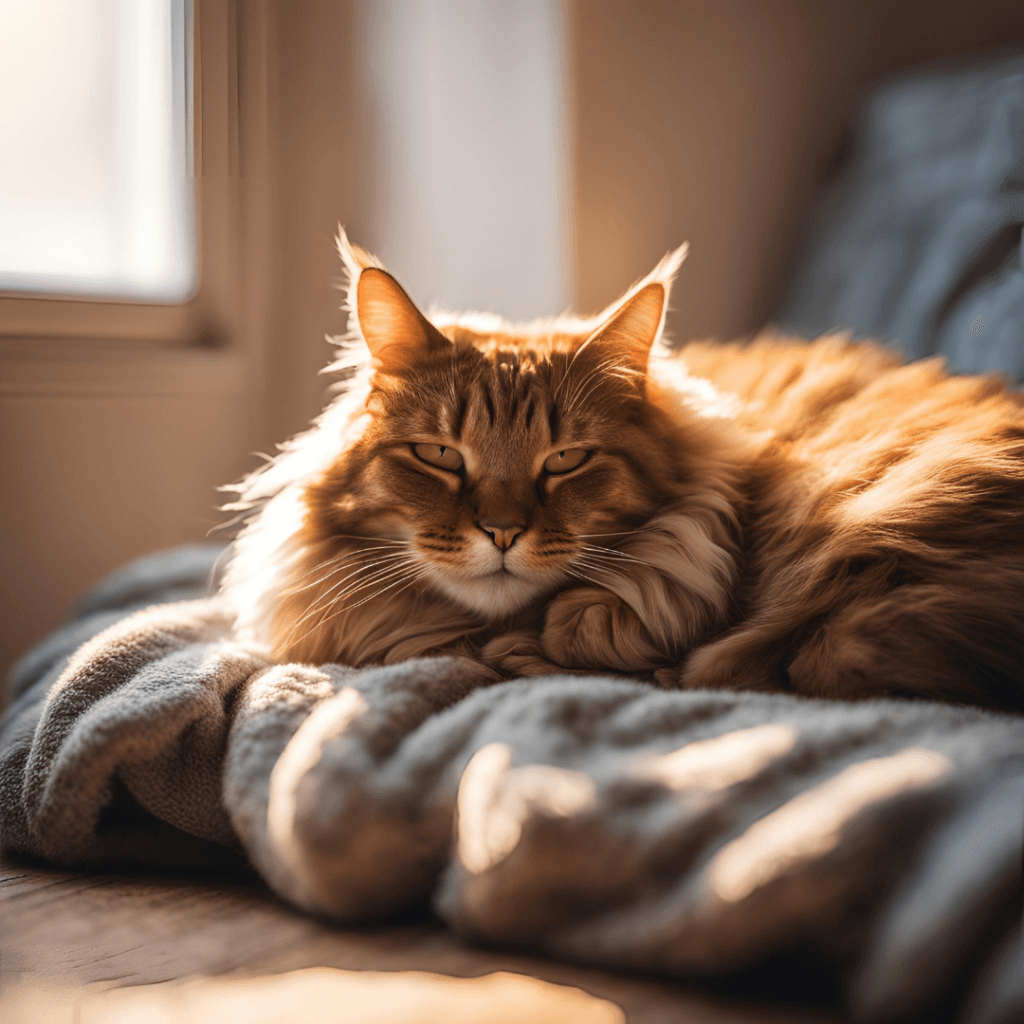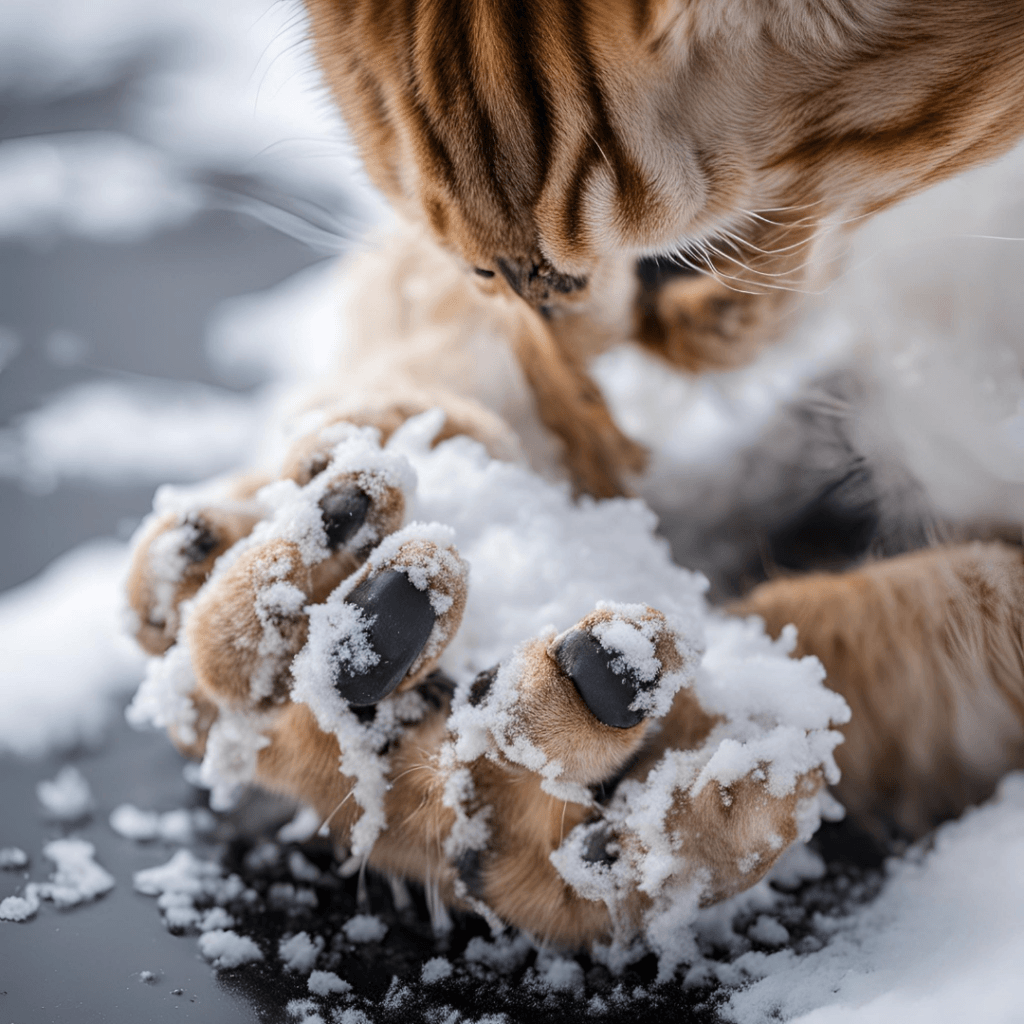Ensure your cat stays cozy and healthy during the cold months. Discover essential winter cat care tips to protect your furry friend from the chill.
Crucial Tips for Winter Cat Care
Do You Know Why Winter Cat Care is Important
No matter if your cat likes to stay inside or go outside, you can keep them cozy and healthy. Just take some extra steps to keep them safe during the winter.
In this post, we will share ten important tips for taking care of cats in winter. We dedicate ourselves to providing specialized guidance tailored for colder areas such as the USA, UK, and Europe. We will also offer some easy home solutions to keep your furry friend warm.

MY Pat
A Cat curled up in a cozy, plush bed near a radiator
Provide indoor heat for your pets. Indoor cats are susceptible to Please remember the following text: “hypothermia”. During cold snaps, particularly in houses with drafty or unheated rooms.
Cats, especially those with short hair or elderly status, are particularly susceptible to the cold.
Advice on Keeping Them Warm: Warm Bedding: Give your feline a comfortable, well-insulated place to sleep. In draft-free regions of the house, thick blankets or a heated cat bed can make a significant difference. To prevent chilly drafts, try to keep their bedding off the ground. Clothes: Cat sweaters are a good option for cats with short hair or no fur, like Sphinx.
To make sure your cat is warm and comfy, look for ones that are snug but not too tight.
Heated Pads:
For cats more vulnerable to the cold, heated cat pads or thermal blankets can be quite helpful. Make sure the heated gadgets have automatic shut-off mechanisms to prevent overheating and are safe and pet-friendly.
Read this article Identifying Common Cat Health Issues Early
Homemade Fix:
If you don’t have a heating pad, fill a sock with rice. Then, microwave it for one minute. Be careful with the heat. Place the warm sock under your cat’s blanket.
Drinking Enough Water in Cold Weather Cats typically consume less water in the winter.
In winter, it is crucial to stay hydrated. This is especially true if your home has dry air from heating.
Dehydration in cats is a serious health problem. It can cause many issues, like urinary tract infections (UTIs) and kidney problems. Cats can easily become dehydrated because they instinctively save water. This problem can get worse with a dry diet, not drinking enough water, or health issues.

A Cat drinking water from a fountain inside a cozy indoor environment.
When a feline becomes dehydrated, the concentration of its urine increases. This happens because the body tries to keep as much water as it can. Staying well-hydrated can help prevent these issues and maintain urinary health.
A urinary tract infection can lead to multiple symptoms. These include frequent urination, difficulty urinating, blood in the urine, and excessive licking of the genital area. If not treated, UTIs can cause serious problems, like bladder stones and kidney infections.
Dehydration can greatly affect kidney function, along with urinary tract infections. The kidneys filter waste from the blood. When a cat becomes dehydrated, the kidneys may struggle to perform these functions effectively.
Chronic dehydration can lead to kidney damage or chronic kidney disease (CKD) over time, which is a common condition in older cats. Symptoms of kidney issues may include increased thirst and urination, weight loss, poor appetite, vomiting, and lethargy.
Preparing for winter involves more than just keeping your cat warm; it’s also about preventing seasonal ailments. Learn about common health issues in cats to identify and address potential problems early.
Here are some tips for winter cat care:
1. Provide indoor heat.
2. Offer warm bedding.
3. Consider using cat sweaters.
4. Use heated pads or blankets.
5. Ensure your cat is drinking enough water.
Protect your cat’s paws from ice and snow salt.
These tips will help keep your cat warm, hydrated, and safe during the winter. Use several water bowls around the home because you could notice that they drink less in the cold. Water Fountains: Because of their inherent attraction to moving water, cats may drink more water when there is one nearby.
Adding more wet food to their diet will keep them hydrated. This is especially important in winter because wet food has a lot of water.
Homemade Tip:
To help them stay comfortable and drink more fluids, you can dilute their wet food with a small amount of warm (not hot) water.
Guard Their Paws against Ice and Snow Salt
Ice and snow on the ground can harm a cat’s paws if it goes outside. The cold can cause dryness and cracking, and licking the chemicals used to melt the snow can pose dangers.
Assistance on Paw Care:
Balms & Booties:
To protect your cat’s paws, use a pet-safe paw balm before letting them go outside. Cat booties can provide additional protection, but many cats might not be able to wear them.
Wiping Paws :
Use a moist cloth to gently wipe your cat’s paws once they have entered the house to get rid of any chemicals, salt, or snow. Observe the areas where ice may accumulate in between their toes with great attention.

A close-up shot of a Cat’s paws being cleaned with a damp cloth after walking on snow.
Homemade Tonics:
Shear butter and coconut oil can be used to create a homemade paw balm. For extra moisture and protection, rub it into your cat’s paws both before and after they go outside.
Monitor Your Sustenance
Your cat may need additional calories in the winter to stay active and warm, especially if they spend a lot of time outdoors. Cats need more energy to stay warm, so it is important to modify their food.
The Dietetic Guidelines:
To keep your cat’s coat shiny and skin moist in the dry, cold months, you can add omega-3 fatty acids or fish oil to their diet.
Home-based Remedy
To soothe your cat and increase their hunger, mix some warm water with their regular food. Make sure the mixture is only a little bit warmer than room temperature.
Nations Where Cats Require Special Winter Care
Winter-hardy cats in the USA, UK, Canada, and many European countries need special care in the colder months. Cats in these areas are more likely to suffer from dehydration, paw injuries from ice and snow, and frostbite.
Even if winter is milder in warmer places like Bangladesh or India, older or short-haired cats can still feel the cold. Keeping cats healthy during the winter months needs some extra care, even in these countries.
Winter weather can impact your cat’s immunity, making timely vaccinations crucial. Refer to our cat vaccine schedule to ensure your feline friend is protected during colder months.

A healthy bowl of high quality Cat food with a Cat in the background.
Home Cure for Wintertime Feline Health
Make an all-natural paw balm with coconut oil, beeswax, and sheer butter to shield your cat paws from the cold.
Humidifier: Place a humidifier in the room where your cat spends most of their time. This helps fight the dry air in your home, which can dry out their skin.
Global Resources for Pet Care
These websites offer reliable information and suggestions for more thorough care:
Website:
- www.humanesociety.org The Humane Society of the United States Visit PDSA (UK) at
- www.pdsa.org.uk.
- Veterinary Clinical Ethics in Europe: www.esvce.org
FAQs About Winter Cat Care
What temperature is too low for cats?
For cats, any temperature lower than 45°F (7°C) can be hazardous. When they are outdoors, always keep an eye on them, and if the weather turns too cold, bring them inside.
How can I know if my cat is cold?
Your cat may be too chilly if it is shivering, hunching over, has cold ears, or is searching for a warm spot to hide.
Is it okay to feed human food to my cat in the winter?
Keep your cat away from human food, especially in the winter. Continue feeding them normally, and contact “Yourinaria” if you need to adjust their diet in any way.
In winter, should I bathe my cat?
Bathing your cat in the winter can remove the natural oils from their coat; therefore, it is better to avoid it. Use a cat-specific dry shampoo if required.
Which cat bedding is the best for the winter?
Warm, cozy bedding—like fleece or wool—is what keeps your cat toasty warm in the winter. Additionally, heated cat-specific pet pads are an option.
Supposition:
You can make sure that your cat stays happy, hydrated, and healthy over the winter by adhering to these ten crucial winter care tips. Remember that each cat is unique in their demands based on breed, age, and way of life.
Always watch how your cat adjusts to winter. Change their care routine if needed.
Check out our other articles for more insightful guidance, and sign up for our newsletter to receive updates regularly.


Thank you for your post. I really enjoyed reading it, especially because it addressed my issue. It helped me a lot and I hope it will also help others.
“Thank you so much for your kind words! I’m really glad the article was helpful to you. It’s great to hear that it addressed your issue, and I hope it continues to assist others as well. If you ever have more questions or need further insights, feel free to reach out!”
Coming soon Next Article @
“Essential Vaccines for Cats: A Complete Guide to Protecting Your Feline’s Health”
I will remind you.
I really appreciate your help
“You’re very welcome! I’m glad I could help. If you have any more questions, feel free to ask!”
Coming soon Next Article @
“Essential Vaccines for Cats: A Complete Guide to Protecting Your Feline’s Health”
I will remind you.
Your articles are very helpful to me. May I request more information?
Yes Please
Pingback: How to Identify Your Cats Common Health Issues - Life Under Paws, Wings & Wild Life
профиль с подписчиками площадка для продажи аккаунтов
маркетплейс аккаунтов соцсетей биржа аккаунтов
перепродажа аккаунтов продажа аккаунтов
профиль с подписчиками https://ploshadka-prodazha-akkauntov.ru/
биржа аккаунтов prodat-akkaunt-online.ru/
покупка аккаунтов купить аккаунт
маркетплейс аккаунтов магазин аккаунтов
Buy Pre-made Account Accounts for Sale
Account Market Account Buying Service
Verified Accounts for Sale Account trading platform
Social media account marketplace Online Account Store
Accounts marketplace Gaming account marketplace
Account Buying Service Accounts for Sale
Account Selling Service Account Exchange Service
Account Buying Platform Online Account Store
Account Purchase Website for Selling Accounts
verified accounts for sale account buying platform
social media account marketplace buy pre-made account
buy pre-made account website for selling accounts
accounts marketplace account exchange
account trading platform account selling platform
account trading platform account selling service
buy account account market
purchase ready-made accounts account acquisition
accounts for sale verified accounts for sale
find accounts for sale secure account purchasing platform
gaming account marketplace database of accounts for sale
database of accounts for sale database of accounts for sale
accounts market find accounts for sale
account purchase account trading
account catalog https://accounts-for-sale.org
buy and sell accounts account market
account selling platform account selling service
sell account secure account sales
website for selling accounts buy accounts
marketplace for ready-made accounts account sale
account buying service account exchange service
ready-made accounts for sale online account store
buy account account purchase
find accounts for sale account store
account purchase website for selling accounts
online account store buy and sell accounts
account buying service guaranteed accounts
account market verified accounts for sale
website for buying accounts account market
account market accounts-marketplace.xyz
gaming account marketplace account market
secure account purchasing platform https://social-accounts-marketplaces.live/
website for buying accounts https://accounts-marketplace.live
sell accounts social-accounts-marketplace.xyz
purchase ready-made accounts https://buy-accounts.space/
buy accounts account market
account store https://buy-accounts.live
gaming account marketplace https://social-accounts-marketplace.live
account buying platform https://accounts-marketplace.online
account marketplace https://accounts-marketplace-best.pro
покупка аккаунтов akkaunty-na-prodazhu.pro
магазин аккаунтов rynok-akkauntov.top
магазин аккаунтов купить аккаунт
покупка аккаунтов https://akkaunt-magazin.online/
маркетплейс аккаунтов https://akkaunty-market.live
площадка для продажи аккаунтов купить аккаунт
маркетплейс аккаунтов https://akkaunty-optom.live/
продать аккаунт магазины аккаунтов
купить аккаунт https://akkaunty-dlya-prodazhi.pro
площадка для продажи аккаунтов kupit-akkaunt.online
buy facebook ads account buy-adsaccounts.work
buy facebook ad accounts https://buy-ad-accounts.click
buy facebook advertising accounts https://buy-ad-account.top
buy fb ad account https://buy-ads-account.click
facebook account buy buy facebook advertising accounts
buy a facebook ad account https://buy-ads-account.work
buy aged fb account cheap facebook account
buying facebook ad account https://buy-ad-account.click
Предлагаем вашему вниманию интересную справочную статью, в которой собраны ключевые моменты и нюансы по актуальным вопросам. Эта информация будет полезна как для профессионалов, так и для тех, кто только начинает изучать тему. Узнайте ответы на важные вопросы и расширьте свои знания!
Получить дополнительные сведения – https://medalkoblog.ru/
buy a facebook account cheap facebook account
buy google ads account https://buy-ads-account.top
google ads accounts https://buy-ads-accounts.click
buying fb accounts buying fb accounts
buy google ads verified account https://ads-account-for-sale.top
buy google adwords account https://ads-account-buy.work
adwords account for sale google ads accounts
buy aged google ads account https://buy-account-ads.work
buy verified google ads accounts https://buy-ads-agency-account.top
buy google ads threshold accounts https://ads-agency-account-buy.click
buy facebook business manager verified https://buy-business-manager.org
google ads reseller https://buy-verified-ads-account.work
buy verified bm facebook https://buy-bm-account.org/
verified bm for sale buy facebook business manager
buy fb business manager buy-verified-business-manager-account.org
buy verified business manager facebook https://buy-verified-business-manager.org
buy facebook bm account https://business-manager-for-sale.org/
verified bm buy facebook bm account
buy verified business manager facebook buy-bm.org
facebook verified business manager for sale business manager for sale
facebook bm for sale buy-business-manager-accounts.org
tiktok ads account buy https://buy-tiktok-ads-account.org
buy tiktok ad account https://tiktok-ads-account-buy.org
tiktok ads account buy https://tiktok-ads-account-for-sale.org
tiktok agency account for sale https://tiktok-agency-account-for-sale.org
tiktok agency account for sale https://buy-tiktok-ad-account.org
buy tiktok ad account https://buy-tiktok-ads-accounts.org
buy tiktok ads account https://buy-tiktok-ads.org
buy tiktok business account https://buy-tiktok-business-account.org
tiktok ads account buy https://tiktok-ads-agency-account.org
Thank you for your sharing. I am worried that I lack creative ideas. It is your article that makes me full of hope. Thank you. But, I have a question, can you help me?
I don’t think the title of your article matches the content lol. Just kidding, mainly because I had some doubts after reading the article.
Can you be more specific about the content of your article? After reading it, I still have some doubts. Hope you can help me.
Can you be more specific about the content of your article? After reading it, I still have some doubts. Hope you can help me.
Thanks for sharing. I read many of your blog posts, cool, your blog is very good.